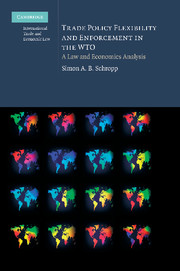Book contents
- Frontmatter
- Contents
- List of figures
- List of abbreviations
- Acknowledgements
- Foreword
- 1 Introduction: trade policy flexibility in the WTO – vice or virtue?
- PART I An introduction to incomplete contracting
- PART II Theorizing about the WTO as an incomplete contract
- PART III Flexibility and enforcement in the WTO: towards an agenda for reform
- Bibliography
- Index
1 - Introduction: trade policy flexibility in the WTO – vice or virtue?
Published online by Cambridge University Press: 05 May 2010
- Frontmatter
- Contents
- List of figures
- List of abbreviations
- Acknowledgements
- Foreword
- 1 Introduction: trade policy flexibility in the WTO – vice or virtue?
- PART I An introduction to incomplete contracting
- PART II Theorizing about the WTO as an incomplete contract
- PART III Flexibility and enforcement in the WTO: towards an agenda for reform
- Bibliography
- Index
Summary
But to my mind, though I am native here
And to the manner born, it is a custom
More honour'd in the breach than the observance
William Shakespeare, Hamlet, Act I, Scene 4This study deals with the rational design of trade policy flexibility and remedies in the World Trade Organization (WTO). It examines whether, and under what circumstances, contractual non-performance (or escape) may be considered more honour'd than the observance of previously made trade commitments, at what cost for the breaching Member, and with what effect for the global trading order.
The WTO is a multilateral trade agreement and as such the international equivalent of a contract. It lies in the nature of a trade accord that governments accept far-reaching trade liberalization concessions, which severely limit their domestic policy discretion in the future. Prior to the conclusion of the Agreement, countries did not possess full knowledge of the nature, probability of occurrence, or impact of future events. Nor were they able to anticipate the possible trade policies and instruments that their trade partners might concoct in the course of the contractual performance. Asymmetrical information settings, uncertainty over future environmental contingencies, bounded rationality, limited resources, or mishap, or a mix of the above, at the time of its conclusion make the WTO an inherently incomplete contract.
- Type
- Chapter
- Information
- Trade Policy Flexibility and Enforcement in the WTOA Law and Economics Analysis, pp. 1 - 26Publisher: Cambridge University PressPrint publication year: 2009



